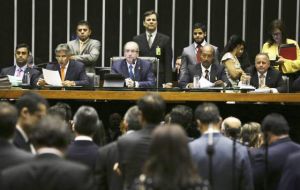MercoPress. South Atlantic News Agency
Impeachment battle against Rousseff begins Monday in Congress
 The action in Congress kicks off what could be a months-long battle over the president's fate just as the economy finds itself bogged down in recession
The action in Congress kicks off what could be a months-long battle over the president's fate just as the economy finds itself bogged down in recession  Rousseff is accused of illegal accounting maneuvers in the government's handling of the federal budget.
Rousseff is accused of illegal accounting maneuvers in the government's handling of the federal budget.  She has repeatedly said she is not guilty and that the accounting tricks were a long-accepted practice in previous governments.
She has repeatedly said she is not guilty and that the accounting tricks were a long-accepted practice in previous governments. Impeachment proceedings against Brazilian President Dilma Rousseff face their first major hurdle Monday when a special committee forms to decide whether to send the case to the full lower house. Once established, the 65-member committee representing all parties will hear Rousseff's defense, then rule on whether to allow the matter to go further.
The action in Congress kicks off what could be a months-long battle over the leftist president's fate just as the world's seventh largest economy finds itself bogged down in recession and fallout from a giant corruption scandal centered on the state oil company Petrobras.
Rousseff is accused of illegal accounting maneuvers in the government's handling of the federal budget. She has repeatedly said she is not guilty and that the accounting tricks were a long-accepted practice in previous governments.
She calls the movement to oust her “a coup.” For now, the presidency believes it has enough support to ride out a vote in Congress.
The lower house would have to vote by more than two thirds for the case to be sent for a formal trial in the Senate, where again a two-thirds majority would be needed to remove Rousseff from office.
However, Rousseff allies want impeachment proceedings to move rapidly, while the opposition is expected to try to stall in order to benefit from popular discontent with Rousseff.
In the meantime, Brazil's economic woes and political gridlock are expected to deepen.
Brazil, host of the 2016 Rio Olympics, is in a deep gloom, with GDP down 4.5% in the third quarter year-on-year, and the national currency down a third against the dollar this year.
Rousseff is also tainted by the Petrobras scandal, which has sucked in leading politicians and business figures, exposing the depth of corruption at the highest levels in Brazil.
The key will be whether her Workers' Party coalition partner the PMDB stays loyal, with speculation rife that cracks are already growing.
But the lawyer who initiated Brazil's last successful impeachment of a president, in 1992, attacked what he said was a politicized and unfair campaign against Rousseff.
Marcello Lavenere, now 77, was an attorney and president of the Brazilian Bar Association when he co-authored a petition for impeachment of then-president Fernando Collor de Mello on grounds that Collor benefited from an influence peddling scheme.
The corruption charges were serious enough for Congress's lower house and Senate to vote overwhelmingly for Collor's ouster, even if he tried to scupper the impeachment trial by resigning.
Lavenere told Folha newspaper that the charges against Rousseff are lightweight in comparison.




Top Comments
Disclaimer & comment rules-

-

-

Read all commentsDilma needs to stop calling it a coup.
Dec 07th, 2015 - 09:16 am 0If it is constitutional, then it can't be a coup.
They always fall back on whining about it not being fair or lawful. Bad losers.
Dec 07th, 2015 - 09:57 am 0In my opinion a plausible alternative is military intervention!
Dec 07th, 2015 - 10:41 am 0Left alternative translates into better option for the Brazilian people that a right-wing government (PMDB/PSDB), which would be coup with terrible consequences for the next elected presidents who do not obtain a majority in Congress.
We have several nationalist generals who do not belong to the ruling class in Brazil that could lead the country at this time.
So me and all who think like me start to shake our headquarters to intervene in government and close the Congress for at least 15 years. A military junta backed by legal experts would draw up a new constitution.
The current politicians of the Congress and any member of their families would be ineligible for 100 years.
The military hierarchy is better than the corrupt right.
That's my opinion and I worked for it from now on.
If the federal government suffer a coup the military must step in and take charge of the country.
https://www.youtube.com/watch?v=rLqj2LUm5l0
Commenting for this story is now closed.
If you have a Facebook account, become a fan and comment on our Facebook Page!